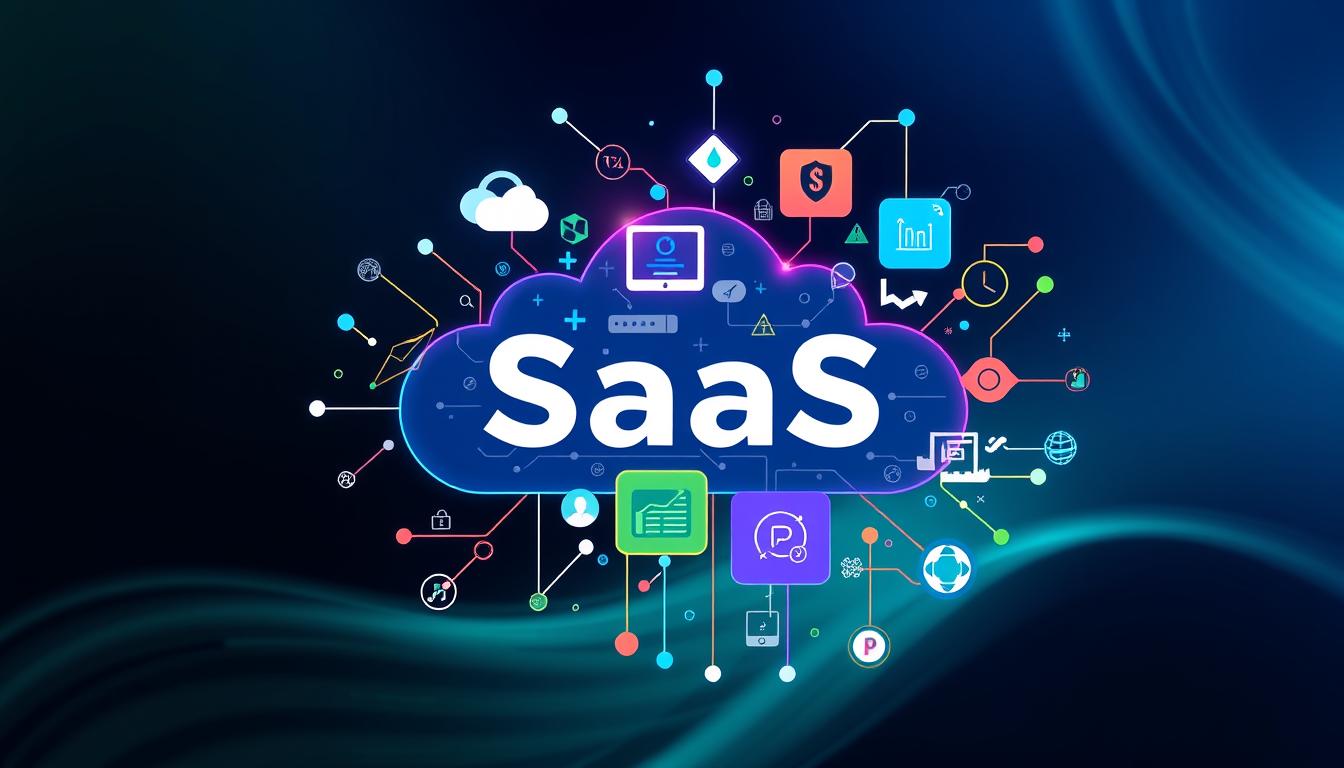Last Updated on December 9, 2025
The integration of artificial intelligence software as a service (AI SaaS) is revolutionizing the tech industry. It rapidly analyzes vast data sets and automates critical tasks, reshaping business software use. This innovation offers access to robust applications without the hassle of physical installations. It’s vital for startups and established companies alike to grasp AI’s potential in SaaS.
This understanding is key to streamlining operations and staying competitive in today’s fast-paced world. The AI market is booming, with revenue projected to hit $118.6 billion by 2025. Moreover, 35% of SaaS companies are already leveraging AI, with 42% planning to do so soon. For more insights into these cloud computing trends driving AI innovation, explore further.
Key Takeaways
- AI is reshaping the SaaS landscape.
- Expected AI software revenue growth to $118.6 billion by 2025.
- 35% of SaaS businesses currently utilize AI technologies.
- 42% of companies plan to adopt AI soon.
- AI enhances customer experience and operational efficiency.
The Rise of AI in SaaS
The integration of AI in SaaS is transforming business operations. Companies aim for efficiency and effectiveness, with tech innovation platforms leading the way. This shift has significantly enhanced the capabilities of organizations using data-driven SaaS applications.
Understanding the Impact on the Tech Landscape
AI’s introduction into SaaS has boosted operational performance and customer engagement. A significant 34% of SaaS companies have seen notable productivity gains after adopting AI. This move towards automation is widespread, with over 67% of SaaS businesses using AI to enhance their offerings.
Major players like Shopify and Salesforce are at the forefront of this trend. Shopify uses AI to offer personalized tutorials to new sellers. Meanwhile, Salesforce’s Einstein Bots provide AI-driven customer support, significantly improving user satisfaction.
Growth Statistics: AI Revenue Projections
The AI SaaS market is experiencing extraordinary growth. Valued at $71.54 billion in 2024, it’s expected to reach $775.44 billion by 2031, with a CAGR of 38.28%. In 2024, the AI market surpassed $184 billion, a $50 billion increase from the previous year.
These figures underscore AI’s critical role in modern SaaS strategies. Notably, 83% of SaaS vendors without AI plans intend to adopt it within a year. This shows a strong commitment to staying ahead with tech-driven solutions.

This rapid growth highlights the need for AI investment and innovation. With the SaaS market expected to reach $700 billion by 2030, AI will continue to shape business software. It will drive significant advancements in strategy and implementation. For more on integrating AI, explore resources through remote onboarding training programs.
Unlocking the Power of AI SaaS Innovation
The fusion of artificial intelligence with Software-as-a-Service (SaaS) is revolutionizing business operations. Companies are now tapping into the power of machine learning software tools. This move aims to boost efficiency and elevate service quality. It showcases a dedication to embracing advanced technology solutions that meet specific business requirements.
Key Statistics on Integration Trends
Recent studies reveal notable trends in AI adoption within SaaS applications. For example, UiPath’s RPA for invoice processing cut processing time by 80% and operational costs by 50%. Zendesk’s AI chatbot also made a significant impact, reducing customer service response times by 30% and increasing satisfaction by 25% for a leading e-commerce platform.
How Businesses Are Harnessing AI Capabilities
Organizations are tapping into AI-enabled SaaS applications to explore new growth avenues. A retail chain, for instance, used Salesforce Einstein’s predictive analytics to reduce excess inventory by 20% and increase sales by 15%. Platforms like Google Analytics have empowered businesses to monitor user engagement in real-time. This has led to a 25% jump in user retention rates.
The State of AI in SaaS
The AI landscape in SaaS is rapidly changing. More companies are now focusing on advanced software as a service, leading to increased AI adoption. This growth is evident in various sectors, showing a trend towards wider AI integration.
Current Landscape and Adoption Rates
The SaaS industry has seen a significant expansion, from around 72,000 to over 175,000 companies, especially those focused on AI. Currently, about 35% of SaaS businesses have adopted AI, with another 42% planning to soon. This surge is driven by the quest for efficiency and better customer service. AI automates routine inquiries, cuts down support tickets, and boosts security by detecting threats instantly.
Examples of AI Integration in Popular Platforms
Many leading platforms are leveraging AI to improve user experiences and business functions:
- Salesforce uses its Einstein platform for predictive analytics, aiding sales teams in identifying leads and crafting engagement strategies.
- HubSpot employs AI for personalized user recommendations based on specific behaviors.
- Zoom’s AI technology enhances video quality and reduces distractions during calls.
- Oracle integrates AI in its cloud security applications for real-time threat detection.
- Dropbox’s “Smart Sync” feature uses AI to improve search and organization.
The rise in AI-based firm acquisitions highlights AI’s viability in software development. For example, the $12.25 billion acquisition of Qualtrics International by Silver Lake and the Canada Pension Plan Investment Board shows growing trust in AI-driven solutions. These investments signify a shift towards AI-driven transformations in software applications.
Advantages of AI in SaaS Applications
The integration of AI into SaaS applications brings numerous benefits, enhancing both business operations and user experiences. It enables tailored interactions and streamlines processes, showcasing the undeniable impact of AI SaaS Innovation. Organizations embracing innovative AI solutions gain a competitive edge, staying ahead as these technologies evolve.
Personalization and User Experience
By analyzing vast amounts of data, SaaS applications can offer a more personalized user experience. AI tailors interactions and recommendations based on user preferences and behaviors. This leads to increased engagement and satisfaction, creating a more enjoyable interface for users.
Automation of Repetitive Tasks
AI excels in automating repetitive tasks, freeing employees to focus on strategic initiatives. This boosts productivity, allowing teams to dedicate resources to critical projects that drive growth. With AI handling mundane tasks, businesses can scale without significantly increasing their workforce.
Predictive Analytics and Data Insights
AI enhances predictive analytics in data-driven SaaS applications, providing valuable insights for decision-making. It leverages historical data and trends to anticipate challenges and optimize resources. This enables businesses to make informed strategic decisions, ensuring they remain competitive in a rapidly changing market.

AI and SaaS: A Match Made in Tech Heaven
The fusion of AI and SaaS brings forth advanced software solutions that revolutionize business operations. By merging cutting-edge technology, companies tap into AI-enabled SaaS applications. This unlocks significant efficiency gains and boosts user satisfaction. Various organizations showcase how these innovations enhance their services, delivering unmatched customer experiences.
Real-World Use Cases of AI in SaaS
- HubSpot’s Use of AI: This platform tailors marketing strategies with AI, enabling businesses to connect more deeply with their audience.
- Zoom’s AI-Enhanced Features: Zoom’s AI-powered video enhancements significantly elevate user experiences in virtual meetings.
- AI-Driven Automation: AI in SaaS automates workflows, streamlining tasks like customer onboarding and order processing. This frees up resources for companies.
- AI-Enabled Chatbots: These virtual assistants offer 24/7 customer service, enhancing response times and customer satisfaction.
- Predictive Analytics: AI helps identify patterns and insights, aiding in data-driven decision-making.
- Cybersecurity Enhancements: AI algorithms detect and mitigate cyber threats in real-time, ensuring data security.

Key Challenges and Ethical Considerations of AI in SaaS
AI in SaaS offers numerous benefits but also raises critical ethical concerns. Ensuring fairness in algorithmic decision-making is a major challenge. Companies must address potential biases in automated processes, like recruitment. Many are adopting bias mitigation strategies to make their AI systems fair and unbiased.
Data privacy is another crucial aspect. Safeguarding sensitive information is essential as SaaS providers integrate AI technologies. By adopting privacy-by-design principles during AI development, they protect personal data, financial records, and health information.

Transparency and explainability are key ethical considerations. Customers must trust AI systems, which requires clear communication about decision-making processes. Accountability in AI processes is also vital. Consumers and regulators expect SaaS providers to justify their AI decisions, building trust in their applications.
The impact of AI on the job market is a significant challenge. As automation spreads, organizations must prepare for job displacement. They need to invest in reskilling efforts. This requires a proactive stance from industry leaders, emphasizing ethical principles and governance frameworks for the evolving AI landscape in SaaS.
Establishing ethical guidelines, like fairness and transparency, is essential in addressing these challenges. Each SaaS provider must adapt these principles to their domain, ensuring ethical AI practices while delivering value. Regular audits, risk assessments, and continuous ethical reflection enhance accountability and governance in AI development.
The Future of AI in SaaS
The SaaS landscape is on the cusp of a significant transformation, driven by tech innovation platforms. Companies are now embracing AI software development. This move aims to introduce innovative AI solutions that redefine business operations and customer interactions.
Emerging Trends and Technologies to Watch
As we look ahead, several trends are worth monitoring:
- Hyper-personalization: SaaS applications will focus on delivering tailored experiences that resonate with individual user preferences. For instance, companies like Spotify enhance user engagement by using AI to create personalized playlists that change with behavior patterns.
- AI-driven chatbots: Tools that provide 24/7 assistance have become essential. This shift not only improves customer satisfaction but also enables businesses to handle inquiries more efficiently.
- Predictive analytics: Leveraging AI, businesses can forecast user trends and behaviors. A perfect example is Salesforce’s Einstein Analytics, which helps sales teams target leads with a higher likelihood of conversion.
Hyper-Personalization and Intelligent Platforms
The demand for innovative AI solutions fostering hyper-personalization is evident across various sectors. Intelligent platforms utilizing real-time analytics and machine learning are becoming commonplace. For example, Adobe’s Creative Cloud suite focuses on developing features based on user interactions, ultimately leading to enhanced product offerings.
B2B SaaS platforms are gaining traction by offering scalability and continual updates. This capability ensures businesses remain competitive. With tools like Zapier automating repetitive tasks, efficiency and productivity rise, allowing organizations to redirect focus toward growth and innovation.
As AI technologies evolve, the integration of AI into these platforms not only heightens customer experience but also fortifies operational capabilities. This synergy between tech innovation and AI software development is setting the stage for a future filled with potential.
AI Development Companies Leading the Charge
In the rapidly evolving landscape of AI in SaaS, several companies stand out for their contributions to innovative AI solutions. Major players like Google, Amazon Web Services, and IBM are harnessing cutting-edge technology solutions to empower businesses. Their robust AI capabilities are crucial for firms seeking to streamline operations and enhance efficiency.
Innovative Solutions from Industry Leaders
These AI development companies are not just leading the charge but are transforming how organizations operate:
- Google is renowned for its extensive AI initiatives, boasting an annual revenue of $305.6 billion and a Glassdoor score of 4.4/5.
- Amazon Web Services provides a range of scalable AI services that support diverse business models.
- IBM integrates AI into its software solutions, enhancing operational capabilities for numerous clients.
- DataRobot helps businesses build predictive models more efficiently, generating an annual revenue of $338.2 million.
- Hugging Face focuses on natural language processing, showcasing their innovative AI solutions tailored for tech startups, with revenues of about $40 million.
The Role of Startups in AI SaaS Evolution
The startup ecosystem is buzzing with activity, adding to the vibrant landscape of AI. Such companies often specialize in niche applications tailored to various industry needs:
- PixelCrayons focuses on adaptive AI solutions, enabling clients to tackle unique challenges and improve operational efficiencies.
- ValueCoders has built over 250 intelligent systems, significantly contributing to the field with their team of 200+ machine learning specialists.
- ActiveCampaign leverages AI to enhance user engagement, offering innovative marketing solutions that grow with your business.
Conclusion
The fusion of AI and SaaS marks a significant leap in tech innovation platforms, opening up vast opportunities for businesses. By embracing AI SaaS innovation, you can achieve unparalleled productivity, better customer experiences, and deep insights from advanced data analysis. For many, adopting AI is no longer just beneficial; it’s crucial for staying competitive in the fast-paced SaaS world.
Investments in AI and advanced SaaS are setting the stage for a future where hyper-personalization, enhanced security, and efficiency are standard. With 83% of business leaders seeing AI as a key strategy, those using these technologies can adapt and innovate ahead of their rivals. As we near 2025, the SaaS model offers cost-effective solutions and continuous updates, meeting the evolving needs of today’s businesses.
In the years ahead, the collaboration between AI and SaaS will redefine the business landscape, leading to significant performance and engagement enhancements. Companies that seize this opportunity now will not only endure but excel, leading the way in predictive analytics, workflow automation, and customer interaction optimization. This is your chance to connect with the future of technology; the possibilities are endless.








